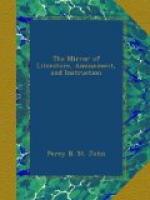“A single one of these numerous diamonds,” said Bebut to himself, “would make my fortune and that of Tamira! I am incapable of a breach of trust; but were I to commit one, would Abbas be the worse for it? No, so far from it, he would have made two of his subjects happy without being aware. Now, any body else situated as I am, would manage to put aside a vast treasure out of a job like this; but one, and that a very small one, of these many gems will be enough for me. It will be wrong, I confess, but I will replace it by a false one, cut and enchased with such exquisite taste and skill, that the value of the workmanship shall make up for any want of value in the material. It will be impossible to see the change; God and the Prophet will see it plainly enough, I know; but I will atone for the sin, and it shall be my only one. Sometime or other I will go a pilgrimage to Mashad, or even to Mecca, should my remorse grow troublesome.”
Thus, by the power of a “but,” did Bebut the Honest contrive to quiet his conscience. The diamond was removed: a bit of crystal took its place, and the jigha appeared more brilliant than ever to the courtiers of Abbas, who, as they never spoke to him but with their foreheads in the dust, could, of course, form a very accurate estimate of the lustre of his jewels.
One day during the spring equinox, as the chief of the sectaries of Ali, according to the custom of Persia, was sitting at the gate of his palace to hear the complaints of his people, a mechanic from the suburb of Julfa broke through the crowd; he prostrated himself at the feet of the Abbas, and prayed for justice; he accused the kazi of corruption, and of having condemned him wrongfully. “My adversary and I,” said he, “at first appealed to Bebut the Honest, who decided in my favour.” Being informed who this Bebut was whose name for honesty stood so high in the suburb of Julfa, the Schah ordered the kazi into his presence. The monarch heard both sides and weighed the affair maturely. He then pronounced for the decision of Bebut the Honest, whom he ordered the kalantar, or governor of the city, immediately to bring before him.
When Bebut saw the officer and his escort halt before the shop where he worked, a sudden tremor ran through his frame; but it was much worse when, in the name of the Schah, the officer commanded him to follow. He was on the point of offering his head at once, in order to save the trouble of a superfluous ceremony which could not, he thought, but end with the scimitar. However, he composed himself, and followed the kalantar.
Arrived before Abbas, he did not dare lift his eyes, lest he should see the fatal aigrette, and the false diamond rise up in judgment against him. Half dead with fright, he thought he already beheld the fierce rikas advancing with their horrid hatchets.
“Bebut, and you, Ismael-kazi,” said Abbas to them, “listen. Since, of the two, it is the jeweller who best administers justice, let the jeweller be a judge, and the judge be a jeweller. Ismael, take Bebut’s place in the workshop of his master: may you acquit yourself as well in his office, as he is sure to do in yours.”




